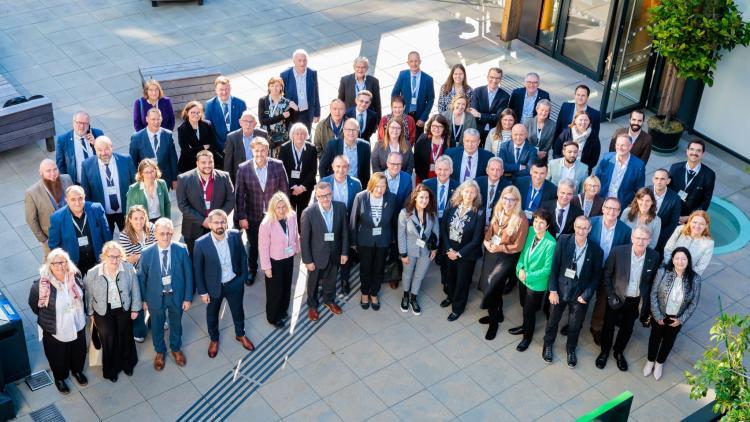15th forum of Rectors and deans of the Association of European universities of life sciences (ICA) 2025

On October 16-17, 2025, the University of Natural Resources and life sciences (BOKU, Vienna) hosted the 15th forum of Rectors and deans of the Association of European universities of life sciences (ICA) under the motto «Navigating Complexity: ICA Leading the Circular Bioeconomy Transformation».
The event brought together 75 participants from 24 countries — rectors, deans and representatives of the higher academic and managerial staff of universities of life sciences to discuss key challenges and opportunities in the field of bioeconomics. The forum was attended by the rector of the National University of Life and Environmental Sciences of Ukraine Vadym TKACHUK.
The 2025 forum focused on the critical role of life sciences universities in shaping and implementing policies that promote innovation, sustainability, and the transition to a circular bioeconomy. Life sciences universities are at the forefront of generating the knowledge, technological advances, and capacity-building needed to move towards a circular and sustainable bioeconomy.
Among the main tasks of the forum are strengthening the interaction of science and policy, demonstrating the best practices of ICA member universities, developing network cooperation between the academic community, government agencies and industry, as well as promoting practical solutions to the real challenges of circular bioeconomics.
The first day of the forum, on October 16, was devoted to the participation of universities of life sciences in shaping policies and strategies in the field of bioeconomics at the regional, European and global levels.
The event began with a welcome session with the participation of Maria KNUTSON-WEDEL, rector of the Swedish Agrarian University in Uppsala, and Eva SHULEV-STEINDL, rector of BOKU. Maria KNUTSON-WEDEL presented an introductory presentation on «Navigating complexity: the role of life sciences universities».
Among the key reports is a speech by Martin GRIMEL head of the BOKU bioeconomics Center, on defining circular bioeconomics in a complex world, and presentation by Luka JUVANČIĆ, head of the bioeconomics research center of the University of Ljubljana, on scientific ways to political influence.
Special attention was paid to updating the EU's bioeconomics policy. Jessica ROSWELL, the European commissioner for environment, water sustainability and circular economy, presented the commission's strategic priorities on bioeconomics for a sustainable Europe. Peter VERHEIM head of the food systems and bioeconomics division of the Directorate General for research and innovation of the European commission, spoke about the new EU strategy on life sciences and its implications for bioeconomics.
The global context was presented in the speech by Ben DURHAM, chief Director of the bioinnovation department of the Ministry of Science, Technology and Innovation of South Africa, who presented the G20 initiative case study. Yucca CANTOLA chairman of the World Association of bioeconomics, shared his vision of combining global bioeconomics programs.
The main speech of the first day was a panel discussion «How can universities align their activities with the EU goals in the field of bioeconomics and influence them?» moderated by Maryna PINTAR, dean of the faculty of biotechnology of the University of Ljubljana. Participants in the discussion were students, government agencies, industry and the academic community representatives.
The evening program was held in the historic Vienna city Hall, where the award ceremony ICA Excellence Awards 2025 was held by the vice-mayor of Vienna.
The second day of the forum was dedicated to an interactive exchange of practices from ICA member universities, discussing the key findings of the first day and moving to the focus «From ideas to implementation — universities as drivers of changes».
The central part of the program was «Spotlight Session» — a session of short presentations from selected universities of life sciences that presented successful practices, in particular: integration of circular bioeconomics into curricula, creation of regional bioeconomics hubs and living laboratories, support for startups and spin-offs in the field of biological solutions, as well as intersectoral partnerships with industry and government agencies.
The forum ended with a discussion of the conclusions and determination of further directions for joint ICA activities.
This event has become an important platform for strengthening cooperation between the academic community, government agencies and businesses, contributing to the effective contribution of research and innovation of life sciences universities to the development of a sustainable and circular bioeconomy.